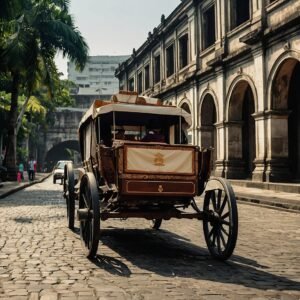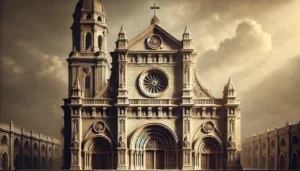
The Malolos Congress: Forging the Foundation of Philippine Democracy
In the annals of Philippine history, few events hold as much significance as the Malolos Congress of 1898. As we stand in the shadow of Barasoain Church, where the echoes of impassioned debates still seem to linger, we are reminded of the monumental task that faced our forebears: the creation of a constitution that would […]
Read More
The Execution of Gomburza: Martyrdom and the Spark of Filipino Nationalism
In the annals of Philippine history, few events have left as indelible a mark on our national consciousness as the execution of Gomburza. On that fateful day of February 17, 1872, three Filipino priests—Fathers Mariano Gómez, José Burgos, and Jacinto Zamora—were martyred by the Spanish colonial government, their lives cut short by the garrote. But […]
Read More
The Battle of Mactan: Lapu-Lapu’s Triumph Against Magellan
The year was 1521. As the warm tropical breeze swept across the shores of Mactan Island, two worlds stood on the brink of a collision that would echo through the annals of history. On one side, the indigenous people of the Philippines, led by the indomitable Datu Lapu-Lapu, stood ready to defend their homeland. On […]
Read More
The Cry of Pugad Lawin: The Spark of the Philippine Revolution
In the annals of Philippine history, few events hold as much significance as the Cry of Pugad Lawin. This pivotal moment, which occurred on August 23, 1896, marked the beginning of the Philippine Revolution against Spanish colonial rule. As a historian who has dedicated his life to studying this critical period, I am compelled to […]
Read More
Intramuros: The Walled City of Manila and Its Historical Significance
Intramuros, known as the “Walled City,” stands as a testament to the rich and complex history of Manila, the capital city of the Philippines. This historic district, enclosed by massive stone walls and fortifications, has witnessed centuries of cultural evolution, colonial rule, and pivotal moments that have shaped the nation’s identity. As we delve into […]
Read More
The Encomienda System: Exploitation and Resistance in Philippine History
The encomienda system, a colonial labor system implemented by the Spanish Empire, played a significant role in shaping the socio-economic landscape of the Philippines during the early colonial period. This system, which originated in medieval Spain and was later adapted for use in the Americas, was introduced to the Philippine archipelago shortly after the arrival […]
Read More
The Educational System Under Spanish Rule: Access and Limitations
Before the arrival of the Spanish colonizers, education in the Philippine archipelago was largely informal and centered around practical skills. Indigenous communities passed down knowledge through oral traditions, apprenticeships, and daily life experiences. Children learned survival skills, cultural practices, and societal norms from their elders and community members. This system, while effective for maintaining cultural […]
Read More
The Manila Cathedral: A Symbol of Colonial Power and Faith
The Manila Cathedral, officially known as the Minor Basilica and Metropolitan Cathedral of the Immaculate Conception, stands as a testament to the enduring influence of Spanish colonialism and Catholicism in the Philippines. Its history is deeply intertwined with the founding of Manila as a colonial capital and the establishment of the Catholic Church’s presence in […]
Read More
Forgotten Heroes: Unsung Figures of Philippine History
The tapestry of Philippine history is rich with tales of bravery, sacrifice, and unwavering patriotism. While names like José Rizal and Andrés Bonifacio are etched into the national consciousness, countless other heroes have faded into obscurity. These unsung figures played pivotal roles in shaping the nation’s destiny, yet their contributions remain largely unrecognized. This blog […]
Read More
The Establishment of the Philippine Assembly: Steps Towards Self-Governance
The establishment of the Philippine Assembly marks a crucial milestone in the journey of the Philippines towards self-governance and independence. To fully appreciate the significance of this development, it is essential to understand the historical context in which it occurred. The late 19th and early 20th centuries saw the Philippines transition from Spanish colonial rule […]
Read More